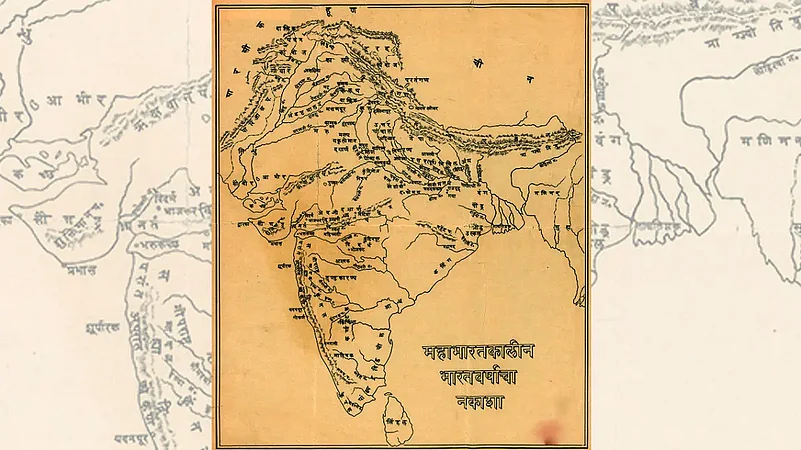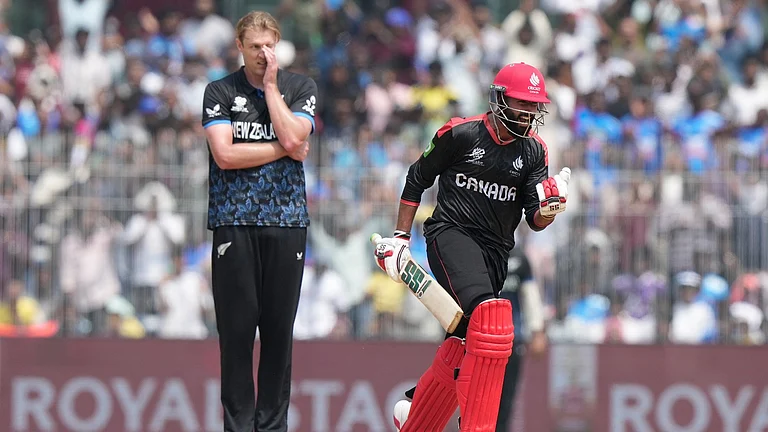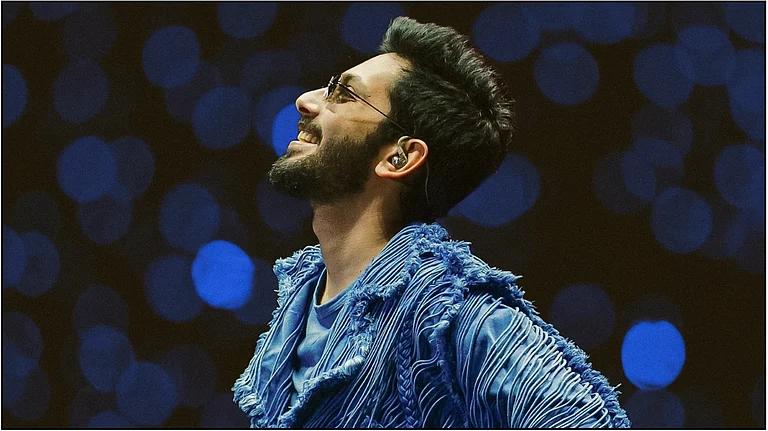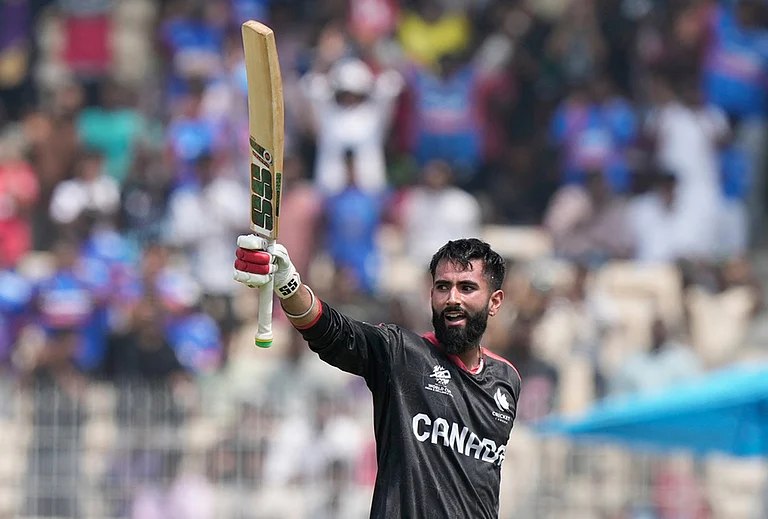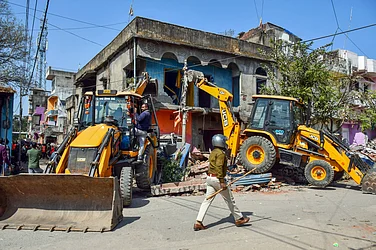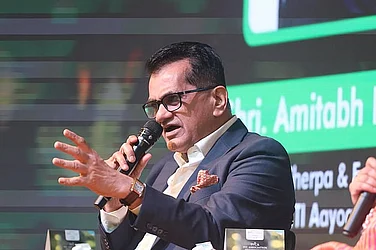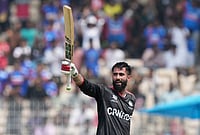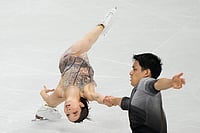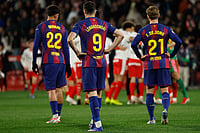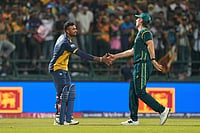In all the debates about the ruling establishment’s resurrection of history as an instrument of its majoritarian politics, many of us are guilty of not looking beyond the Hindutvavadis’ obvious political misuse of the past to further their interests in the present. In fact, history plays a profoundly important role in the Hindutva conception of Indian nationalism, and it is worth delving into its ideological underpinnings to understand its present significance.
The concept of nationalism arose around the world, as I pointed out in my book The Battle of Belonging, when the absolute power of the traditional ruler became untenable in more complex societies, and power began to be diffused. At that stage, people began to relate to each other by identifiable and unchanging common features that could be considered the attributes of a nation—a political entity broadly understood to be united by a defined geography, ethnicity, language, religion, and culture, common (and idealised) heroes, and a shared identity and sense of community for all its constituent people.
ALSO READ: History Must Be A Lesson Of Our Past Glory
Indian nationalists fighting the British Raj quickly seized on this, and Hindutva ideologues went farther; in keeping with the race doctrines of the times, Savarkar in the 1920s conceived Hindutva as an indefinable quality inherent in the Hindu ‘race’, which could not be identified directly with the specific tenets of Hinduism. To him, the religion was therefore a subset of the political idea, rather than synonymous with it—something many of its proponents today would be surprised to hear. Despite this distinction, Hindutva would help achieve the political consolidation of the Hindu people, since Savarkar also argued that a Muslim or a Christian, even if born in India, could not claim allegiance to the three essentials of Hindutva: ‘a common nation (rashtra), a common race (jati) and a common civilisation (sanskriti), as represented in a common history, common heroes, a common literature, a common art, a common law and a common jurisprudence, common fairs and festivals, rites and rituals, ceremonies and sacraments’. Hindus, defined as possessing these common values and practices, constituted the Indian nation—a nation that had existed since antiquity, since Savarkar was explicitly rejecting the British view that Indian nationhood was a creation of the foreign imperium.
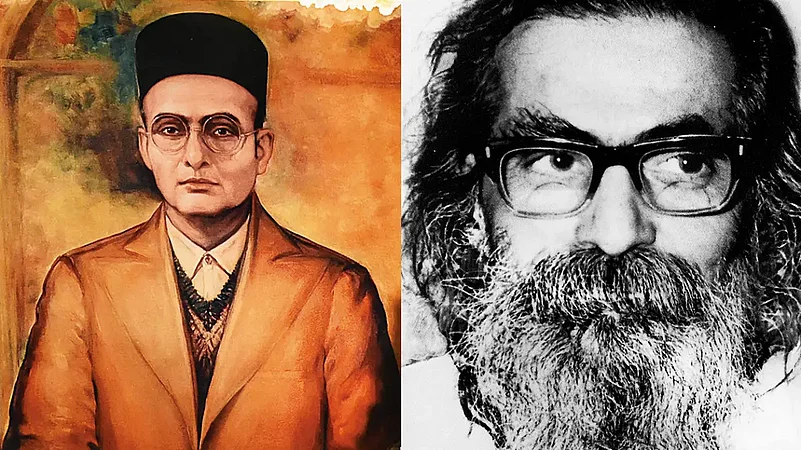
Savarkar’s vision of Hindutva saw it as the underlying principle of a ‘Hindu Rashtra’ that extended across the Indian subcontinent, and was rooted in an undivided India bounded by the mountains and the seas (‘Akhand Bharat‘) corresponding to the territorial aspirations of ancient dynasties like the Mauryas (321 BCE–185 BCE), who under Chandragupta and Ashoka, had managed to knit most of the subcontinent under their control. In the words of a later RSS publication, Sri Guruji, the Man and his Mission, ‘It became evident that Hindus were the nation in Bharat and that Hindutva was Rashtriyatva [nationalism].’
For Savarkar, Hinduness was synonymous with Indianness, properly understood. Savarkar’s idea of Hindutva was expansive: ‘Hindutva is not a word but a history. Not only the spiritual or religious history of our people as at times it is mistaken to be by being confounded with the other cognate term Hinduism, but a history in full.... Hindutva embraces all the departments of thought and activity of the whole Being of our Hindu race.’ In turn, the Hindu ‘race’ was inextricably bound to the idea of the nation. As Savarkar put it, ‘We Hindus are bound together not only by the tie of the love we bear to a common fatherland and by the common blood that courses through our veins and keeps our hearts throbbing and our affections warm, but also by the tie of the common homage we pay to our great civilisation—our Hindu culture.’
However, his idea of Hindutva excluded those whose ancestors came from elsewhere or whose holy lands lay outside India—thereby eliminating Muslim and Christians, India’s two most significant minorities, from his frame of reference. What their place would be in Savarkar’s construction of the nation was not made explicitly clear, but the best they could hope for was a sort of second-class citizenship in which they could live in India only on sufferance.
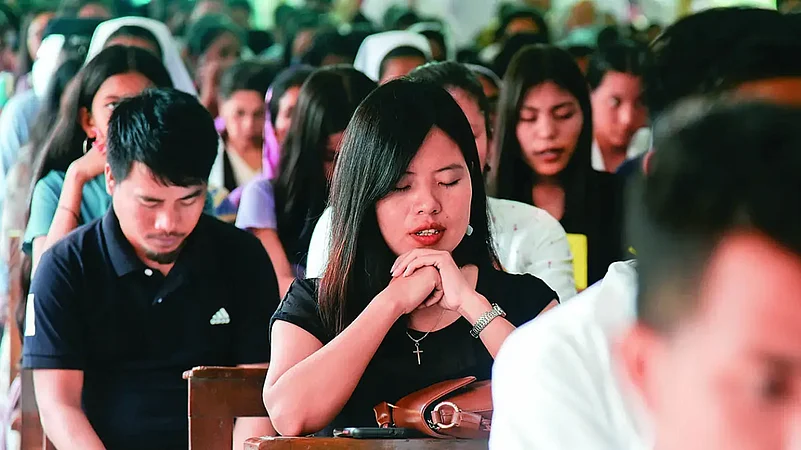
This logic was taken even further by M. S. Golwalkar, the sarsanghchalak or head of the Rashtriya Swayamsevak Sangh (RSS) for three decades (1940–1973), who supplanted Savarkar as the principal ideologue of Hindu nationalism, notably in his 1939 screed We or Our Nationhood Defined and in the anthology of his writings and speeches, Bunch of Thoughts. Golwalkar made it clear in his writings that India was the holy land of the Hindus alone. He writes: ‘Hindusthan is the land of the Hindus and is the terra firma for the Hindu nation alone to flourish upon….’ According to him, India was a pristine Hindu country in ancient times, a place of unparalleled glory destroyed in successive assaults by foreign invaders. He felt that a ‘national regeneration’ was necessary.
The final construction of Hindutva ideology came from Deen Dayal Upadhyay, President of the Bharatiya Jana Sangh and author of Integral Humanism, who argued that India could and should contribute to the world ‘in consonance with our culture and traditions’. That culture and those traditions were, of course, Hindu. In India, ‘there exists only one culture….There are no separate cultures here for Muslims and Christians.’ Every community, therefore, including Muslims and Christians, ‘must identify themselves with the age-long national cultural stream that was Hindu culture in this country’. His logic was that ‘unless all people become part of the same cultural stream, national unity or integration is impossible. If we want to preserve Indian nationalism, this is the only way’. To him, ‘the national cultural stream would continue to remain one and those who cannot identify themselves with it would not be considered nationals’.
To Upadhyaya, the national culture to which he was referring had to be Hindu; it explicitly could not be Muslim. ‘Mecca, Medina, Hassan and Hussain, Sohrab and Rustom and Bulbul may be very significant in their own ways but they do not form a part of Indian national life and stream of Indian culture. How can those who are emotionally associated with these and look upon [the] Rama and Krishna tradition as alien be described as nationals? We see that the moment anybody embraces Islam, an effort is made to cut him off from the entire tradition of this country and connect him to the alien tradition.’
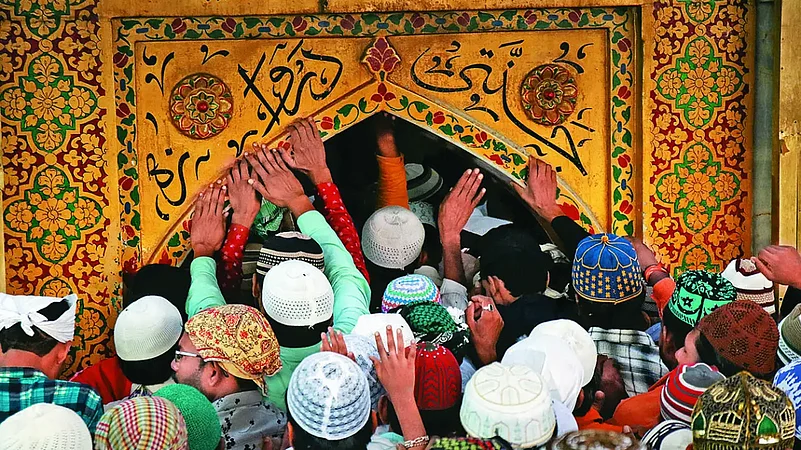
Muslims, said Upadhyaya, even related differently to India’s past: ‘Some events involve triumph, some our humiliation. The memories of our glorious deeds make us proud; ignominies make us hang our heads in shame.’ But Hindus saw such historical events differently from Muslims. ‘Aggressions by Mohammed Ghori or Mahmood Ghazni naturally fill us with agony. We develop a feeling of attachment to Prithviraj [Chauhan] and other patriots. If instead, any person feels pride for the aggressors and no love for the Motherland, he can lay no claim to patriotism. The memory of Rana Pratap, Chhatrapati Shivaji or Guru Gobind Singh makes us bow down our heads with respect and devotion. On the other hand, the names of Aurangzeb, Alauddin, Clive or Dalhousie, fill us with anger that is natural towards foreign aggressors.’ Only Hindu society, Upadhyaya underscored, felt this way about its heroes, supporting Rana Pratap over Akbar; therefore there was really no ground for doubt that Indian nationalism is Hindu nationalism.
Upadhyaya’s conclusion was blunt: the Muslims sought ‘to destroy the values of Indian culture, its ideals, national heroes, traditions, places of devotion and worship’, and therefore ‘can never become an indivisible part of this country’. In Upadhyaya’s vision, the inherent consciousness of unity, identical ties of history and tradition, relations of affinity between the land and the people and shared aspirations and hopes, made Hindustan a nation of Hindus. ‘We shall have to concede that our nationality is none other than Hindu nationality. If any outsider comes into this country he shall have to move in step and adjust himself with Hindu nationality.’
But Upadhyaya did not adopt his mentor Golwalkar’s ideas about dealing with India’s Muslims as Hitler had dealt with the Jews. ‘No sensible man will say that six crores of Muslims should be eradicated or thrown out of India,’ he admitted in an article titled ‘Akhand Bharat: Objectives and Means’. ‘[B]ut then they will have to identify themselves completely with Indian life.’ Muslims had to be accommodated within the Indian reality, but on what basis? ‘This unity…can be established only among homogeneous cultures, not among the contrary ones. A preparation of various cereals and pulses mixed together can be prepared: but if sand particles find their way into it, the whole food is spoilt,’ he explained. The way to eliminate these ‘sand particles’ was to ‘purify’ or ‘nationalise Muslims’—to ‘make Muslims proper Indians’. The Congress-led nationalist movement had wrongly tried to forge Hindu–Muslim unity against the British, but ‘unless all people become part of the same cultural stream, national unity or integration is impossible.… A situation will have to be created in which political aspirations of Islam in India will be rooted out. Then and then alone can a longing for cultural unity take root.’
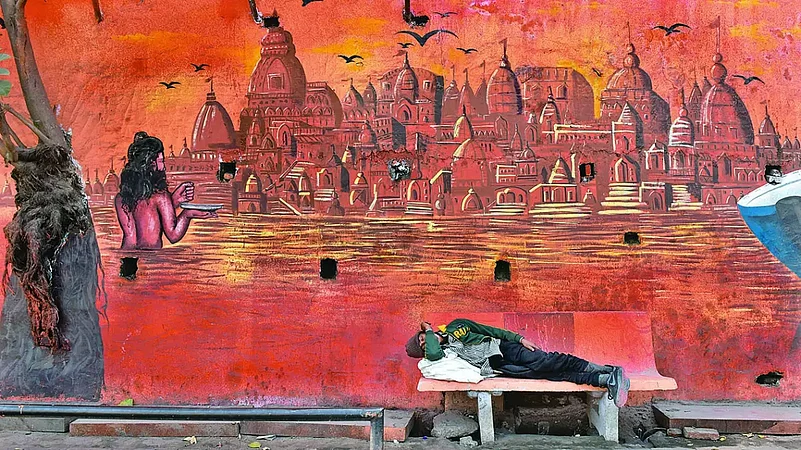
The critics of Hindu Rashtra, Upadhyaya argued, found that the term was inexpedient for them in the country’s competitive politics: they were afraid of losing millions of Christian and Muslim voters. Their misconception was that the use of the term excluded Muslim and Christian communities. If both these communities became one with the national cultural mainstream—without any change in their modes of worship—they would be welcome in the new India. All they had to do was to own up to the ancient traditions of India, to look upon Hindu national heroes as their national heroes, and to develop devotion for Bharat Mata. Then they would be fully accepted as nationals of the Hindu India that he envisioned.
In the Hindutva-centred view, history is made of religion-based binaries, in which all Muslim rulers are evil and all Hindus are valiant resisters, embodiments of incipient Hindu nationalism. The Hindutvavadis believe, in historian Audrey Truschke’s words, ‘that India was subjected to repeated defeats over the centuries, including by generations of Muslim conquerors that enfeebled the people and their land. The belief…that Muslim invaders destroyed their culture, religion, and homeland is neither a continuous historical memory nor is it based on accurate records of the past. But… many in India feel injured by the Indo-Muslim past, and their sentiments [are] often undergirded by modern anti-Muslim sentiments.’ As K. N. Panikkar has stated, liberal and tolerant rulers such as Ashoka, Akbar, Jai Singh, Shahu Maharaj, and Wajid Ali Shah do not figure in Hindutva’s list of national heroes. (Indeed, where many nationalist historians extolled Akbar as the liberal, tolerant counterpart to the Islamist Aurangzeb, Hindutvavadis have begun to attack him too, principally because he was Muslim, and like most medieval monarchs of both faiths, killed princes who stood in his way, many of whom happened to be Hindu.)
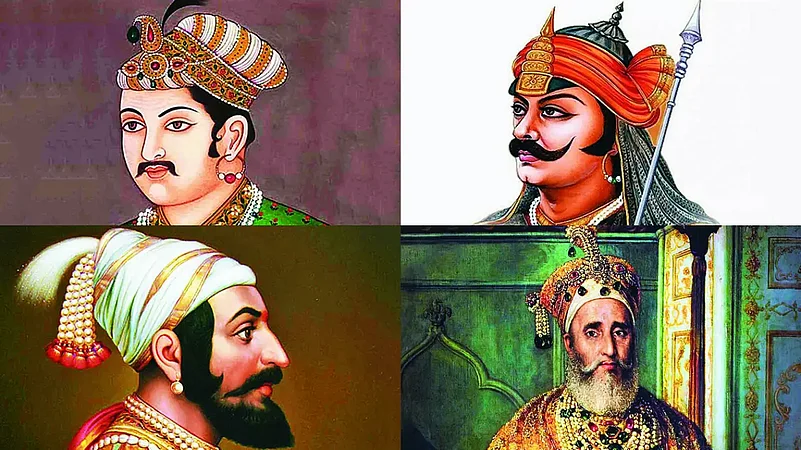
Communal history continues past the era of Islamic rule. Among those Indians who revolted against the British, Bahadur Shah, Zinat Mahal, Maulavi Ahmadullah, and General Bakht Khan, all Muslims, are conspicuous by their absence from Hindutva histories. Syncretic traditions such as the Bhakti movement, and universalist religious reformers like Rammohan Roy and Keshub Chandra Sen, do not receive much attention either. What does is the uncritical veneration of ‘Hindu heroes’ like Maharana Pratap (portrayed now in Rajasthani textbooks as the victor of the Battle of Haldighati against Akbar, which begs the question why Akbar and not he ruled the country for the following three decades) and Chhatrapati Shivaji, the intrepid and courageous Maratha warrior, whose battles against the Mughals have now replaced accounts of Mughal kings in Maharashtra’s textbooks. (The educational system is the chosen battlefield for the Hindutva warriors, and curriculum revision their preferred weapon.)
This is the context in which the current Hindutva campaigns, from textbook revision to challenging mosques built on the ruins of temples, must be understood. Between the ‘civic nationalist’ notion of Indian diversity (which Salman Rushdie celebrated as ‘mongrelisation’) and the Hindutvavadi’s insistence on ‘authentic’ Indian culture—narrowly interpreted, and uncontaminated by colonial influence or “Ganga–Jamuni” hybridity—there lies a chasm. Our nationalist movement and its leaders created a nation built on an ideal of pluralism and freedom: we have given passports to their dreams. This should have been the principal theme of the 75th anniversary of our independence that we celebrate in a few weeks’ time. The BJP, with its insistence on the purity of Hindu Rashtra, would sadly reduce the soaring generosity of their founding vision to the petty bigotry of majoritarian chauvinism.
(This appeared in the print edition as "History and Hindutva Nationalism")
(Views expressed are personal)
Shashi Tharoor is a politician and author






